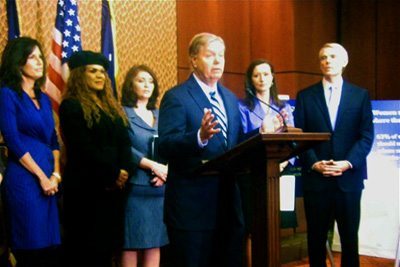Graham Introduces 20-Week Ban in Senate as Primary Challenge Beckons
With a potentially tough Republican primary ahead of him, Sen. Lindsey Graham took the lead on a bill that would ban abortions after 20 weeks post-fertilization—after Sen. Marco Rubio turned down the opportunity.

Surrounded by the women leaders of major (and minor) anti-choice groups, U.S. Sen. Lindsey Graham (R-SC) announced at a Thursday press conference his introduction of S 1670, which would ban all abortions after 20 weeks post-conception. The bill takes aim at the Supreme Court’s decision in Roe v. Wade, which allows abortions until viability. In June, the U.S. House of Representatives passed its version of the bill, HR 1797.
Graham was not the right-wing groups’ first choice for lead sponsor of the bill; that honor went to Sen. Marco Rubio (R-FL), who was considered a likely “get” because of his advocacy of an immigration reform bill had sullied his image among followers of the Tea Party. But for reasons that remain unclear, Rubio apparently got cold feet and declined to lead the charge (although he will sign on as a co-sponsor).
Enter Graham, who has a tough re-election fight ahead of him, with Tea Party and religious-right types lining up to challenge him in his party’s primary. His sins, in their view, include his support for immigration reform, his belief that climate change is real, and votes to confirm President Barack Obama’s judicial nominees. And then there was his criticism of Rand Paul’s anti-drone filibuster as “ill-informed.”
Asked by a reporter to respond to the widely held belief that he is taking the lead on the anti-choice bill in order to shore up his right-wing bona fides, Graham replied, “I came into the political arena pro-life, and I will leave pro-life. Now, whether or not I will leave next June (after the South Carolina GOP primary) or some later period will be up to the voters of South Carolina. Did I wake up, because I’ve got a primary, and say, ‘Let’s be pro-life’? No.”
At last month’s Values Voter Summit, an annual right-wing conference sponsored by FRC Action, the political arm of the Family Research Council, Graham was derided by name from the podium. On Thursday, the Family Research Council’s Anna Higgins joined the group of anti-choice women who lauded the South Carolina senator as an anti-choice hero. Others included Penny Nance, president of Concerned Women for America; Marjorie Dannenfelser, president of the anti-choice Susan B. Anthony List; and Day Gardner, president of the National Black Pro-Life Union.
Graham was introduced by Carol Tobias, president of the National Right to Life Committee, the organization that drafted the model legislation on which the bill is based.
Called the “Pain Capable Infant Protection Act,” the bill rests on the disproven assertion that a fetus at 20 weeks post-conception can feel pain. As his source material, Graham cited the website Web MD.
Whether Graham’s decision to lead the charge on the 20-week ban will be enough to stave off his Tea Party foes remains to be seen. It is worth noting, though, that two of the anti-choice women who joined him head groups that have reaped millions, as Rewire reported, from organizations linked to Charles and David Koch, the billionaire brothers who have bankrolled the Tea Party movement.
One Tea Party astroturf group involved in rounding up primary challengers to run against Graham is unlikely to be placated by his anti-choice gambit: FreedomWorks, which was born of a split from the Koch brothers that finished off the brothers’ Citizens for a Sound Economy in 2004. (The Kochs simply picked up the pieces and fashioned Americans for Prosperity from the rubble.)
As is increasingly the case, this attack on women’s fundamental freedoms appears to be mere fodder in the right’s quest for political power.
Meanwhile, the reason for Marco Rubio’s reluctance to sponsor the anti-choice, 20-week ban bill just may be found in the results of the state’s last election for U.S. Senate, when, in 2012, pro-choice Democrat Bill Nelson trounced the anti-choice Republican Connie Mack, 55 to 42 percent, with the votes of women—who comprised 54 percent of the electorate—giving the Democrat a decided edge, 59 to 39 percent.
When Rewire asked the National Right to Life Committee’s Carol Tobias why Rubio demurred on being lead sponsor of the bill—even after the Weekly Standard, a right-wing news outlet, reported his lead sponsorship as a done deal—she responded, “[T]here was a lot of deliberation of various points of view.” Tobias added, “There were several senators that were considering introducing this bill, and they were looking at a lot of different options and they all came together and Lindsey Graham stepped forward and said, ‘I’d be happy to co-sponsor this,’ and the others said, ‘Great. We’re with you.’ So, it was Senate deliberations. He was one of several that was considering it.”
Rubio is up for re-election in 2016. He is also rumored to be considering a presidential run.
